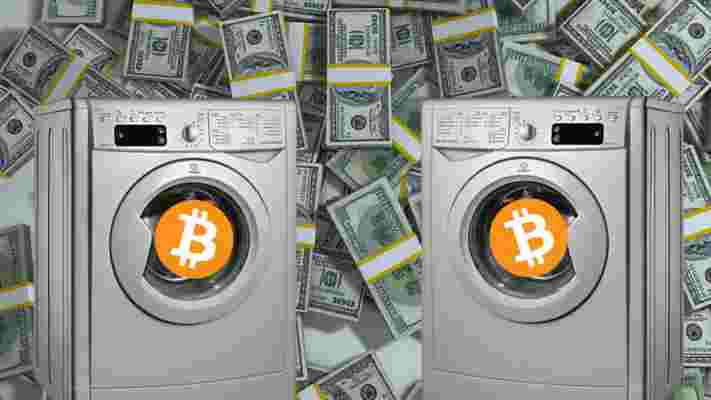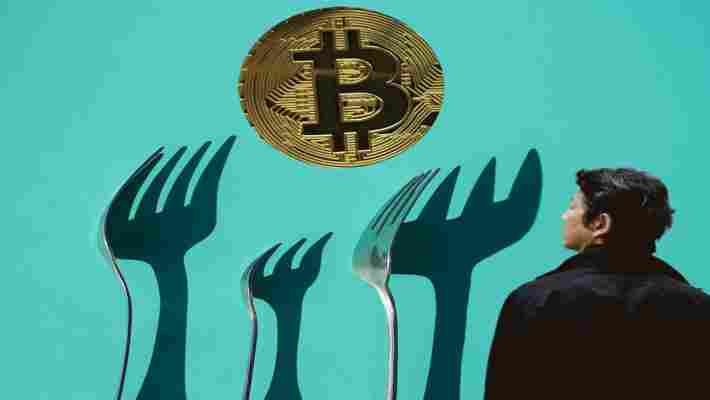New data shows criminals have laundered $2.5 billion worth dirty Bitcoin through cryptocurrency exchanges, and almost all of it ends up in countries with lax Anti-Money-Laundering (AML) regulations.

Cryptocurrency research group CipherTrace conducted an analysis of 45 million transactions from the top 20 cryptocurrency exchanges globally in order to find out the prevalence of Bitcoin’s use for criminal purposes.
The data, which spans from January 2009 to September 2018, indicates 97 percent of the Bitcoin laundered through top exchanges ends up in countries with lenient AML regulations.
CiperTrace deemed transactions to be of criminal nature if they came directly from, or with close connection to, sources such as “dark market sites, extortion, malware, mixer/tumbler/money laundering, ransomware, and terrorist financing services.”
Laundering BTC is easy on unregulated exchanges
CipherTrace found criminals have laundered approximately 380,000 BTC ($2.5 billion), and 97 percent of the Bitcoin criminals send for laundering is to unregulated cryptocurrency exchanges.
In fact, exchanges in countries where there is little-to-no AML regulations receive 36 times more Bitcoin from sketchy individuals or groups.
Considering how easy it is to access unregulated exchanges – some of them are the biggest in the world – it also makes sense that 95 percent of outgoing payments to criminals come from those exchanges.
CipherTrace notes governments can curb the rampant Bitcoin-related money laundering by enacting and enforcing more cryptocurrency AML regulations over the next two years.
We can already see governments making regulatory moves: Japanese regulators have already made local exchanges establish rigid identification processes in order to continue trading.
Similarly, major cryptocurrency exchange service ShapeShift is now forcing users to provide identification to remain compliant with new government rules.
In fact, rival exchange service Changelly directly indicated the anonymity-focused altcoin Monero (XMR) was responsible for its new AML rules – even admitting to having the power to seize XMR in order to verify it has no connection to criminals before processing.
Hackers steal almost $1B in cryptocurrency this year
The report also noted that in the first three quarters of this year, hackers have stolen $927 million worth of cryptocurrency – with $166 million taken in the past three months alone.
Already, cryptocurrency thefts are up a whopping 350 percent over last year.
“Criminals will need to quickly launder these stolen tokens before stronger cryptocurrency anti-money laundering controls are deployed globally over the next 18 months,” the report warns.
The record numbers are (in part) thanks to a slew of new, effective cryptocurrency crime threats. CipherTrace has seen a marked increase in highly targeted mass cyber extortions, SIM swapping , and advanced cyberattacks on exchange personnel.
CipherTrace declares if this trend continues, hackers will have stolen at least $1 billion in cryptocurrency by the end of the year.
Craving more blockchain? Join us at Hard Fork Decentralized, our three-day event in London. We’ll discuss the industry’s future together. You can now register on our website !
Here’s an explainer about soft forks you’ll actually understand
Welcome to Hard Fork Basics, a collection of tips, tricks, guides, and advice to keep you up to date in the cryptocurrency and blockchain world.

If you’ve been following cryptocurrencies and blockchain technology in recent months, you will have come across a lot of debate about ‘forks’.
In programming terms, a fork is a word used to describe a technical event that takes place when participants on a network must agree on a set of common rules.
Forks can be hard or soft. In this article, Hard Fork is going to take a look at what soft forks are, and how they work.
Understanding blockchain
First thing first: within the context of a decentralized, peer-to-peer network such as Bitcoin, a blockchain is an immutable, permanent, ledger used to record transactions.
Bitcoin’s decentralized nature means participants in the network have to agree to a common set of rules in order to validate transactions and achieve consensus.
The blockchain is maintained by a network of cooperative communicating nodes, which operate Bitcoin’s software. Nodes can validate transactions, add them to their copy of the blockchain, and broadcast these additions to other nodes.
So, what the fork?
As I mentioned, a fork is a software change which creates two different versions of a blockchain with a shared history.
If the networks is split permanently, this paves the way for the creation of two different cryptocurrencies (aka Bitcoin and Bitcoin Cash ).
In the past, forks have been used to add new features or functionality to a blockchain, and to reverse the effects of hacking or bugs. They’ve also been floated as a potential solution to Bitcoin’s scalability problem .
Soft fork
A soft fork happens when the software protocol is changed, making previous blocks or transactions invalid.
Old nodes will continue to recognize new blocks as valid. In this instance, the software change is backward-compatible .
Think of a soft fork in the same way you would a change in a street’s speed limit.
Imagine a street has a minimum speed limit of 30m/h. The local transport authority ups it to 40m/h. Those usually traveling at 30m/h need to speed up to comply with the new regulation, or otherwise risk being fined. However, if most drivers disagree with the increase and stick to traveling at 30m/h, the authorities may abandon the increase all-together and enable drivers to carry on as they were.
Soft forks are easier to implement than hard forks because they only require a majority of participants to upgrade the software. Similarly to the speed limit analogy, the majority of nodes must upgrade; otherwise, the soft fork fails, and the original chain carries on unchanged.
When the majority of miners upgrade to establish new rules, this is known as a miner-activated soft fork (MASF). If full nodes coordinate to do the same, with support from miners, we call this a user-activated soft fork (UASF).
A soft fork is essentially a cosmetic change: it modifies or adds functions without actually tampering with the structure of the blockchain itself. However, soft forks cannot be reversed without a hard fork.
Soft forks are arguably the preferred option to upgrade Bitcoin’s blockchain because it’s believed they represent a lower risk of splitting the network.
P2SH , put in motion to alter Bitcoin’s address formatting; and BIP 66 , which sought to improve signature validation, are two examples of successful soft forks which have taken place in recent years.
TRON, Luno, and U°Community will be hosting events at Hard Fork Decentralized
Our blockchain and cryptocurrency event, Hard Fork Decentralized , is coming up in less than two weeks!

Our concept is slightly different to a typical conference – to highlight the importance of decentralization in the industry, we’re organizing a ton of events that are spread out all across London. Hosted by leading blockchain and finance companies, this ‘decentralized’ concept allows everyone to get an inside look into the biggest players in the industry.
Sign up for them now . Join workshops, talks, and roundtables about regulation, scalability, and everything in between. (BTW you’ll need a ticket before you can sign up!)
The idea is to come together and discuss the biggest challenges we face in the industry, and work out how to overcome them. We’ve rounded up a list of events that will tackle these important issues:
TRON: How to achieve mass adoption of blockchain
On December 12 at 13:00, TRON will host a keynote. They’ll discuss how to successfully scale a blockchain network, deliver value to users, and how they believe both TRON and BitTorrent will reach mass adoption of blockchain in the near future. They’ll also be hosting a roundtable discussion afterwards, where the focus will be on answering the question, “can decentralized networks improve how value is exchanged between users and producers?”
If you’d like to join their event, sign up now .
Luno: Investing in a decentralized economy
Cryptocurrency wallet developers Luno will be hosting a panel with leading experts in the industry, where they’ll discuss the evolution of the decentralized ecosystem and its future impact on businesses and economies. Afterwards, there’ll be a Q&A session where you’ll get the chance to ask them more about their thoughts on the future of cryptocurrency.
Want to join Luno’s event? Sign up right here .
London Blockchain Labs: The crypto shift of blockchains, ICOs, and tokens
London Blockchain Labs is the UK’s leading student community based at UCL, LSE, and Imperial College London. At their decentralized event, they’ll discuss how blockchain education is essential in cultivating the industry’s future leaders. Afterwards, they’ll discuss tokenomics in a keynote by Thomas Power, author of Tokenomics: The Crypto Shift of Blockchain, ICOs and Tokens.
You can join their event by signing up right here .
U°Community: Who owns your digital capital?
U°Community is a social platform with a transparent reputation system that allows users to create content, interact with others, run a business, and build dAPPs on the U°OS blockchain-protocol. Join them in discussing how b lockchain technology is able to change the way we use our digital capital to provide greater transparency and sustainability. Afterwards, they’ll host a networking session with appetizers and drinks.
Sign up to their event right here .
UTRUST: The future of payments
UTRUST, a cryptocurrency wallet, will explore the future landscape of payments at their decentralized event. This keynote will be given by Sanja Kon, VP of Global Partnerships.
Want to join their event? You can sign up now .
iCapital: Building a sustainable blockchain system
iCapital is one of Israel’s leading investment firms focused on startups developing blockchain technology. At their decentralized event, they’ll discuss the future of the blockchain investment landscape. Hear prominent investors explain how they evaluate blockchain start-ups in the current market conditions, and what’s required when building a sustainable ecosystem.
Join their event by signing up here .
Make sure you sign up for all these decentralized events fast – seats are quickly filling up!
Our own event, The Exchange , will feature a lineup of great speakers, including Kavita Gupta, Dominik Schiener, and Yoni Assia. The Exchange is co-hosted with The Financial Times and held at citizenM Tower of London, our official venue partner. Check out the full schedule of speakers at our event right here .
Don’t have a ticket for Hard Fork Decentralized yet? No problem – you can get one now .
See you in London?











